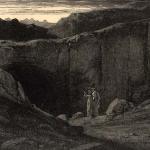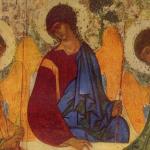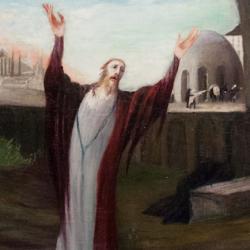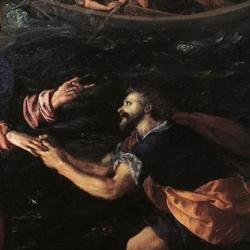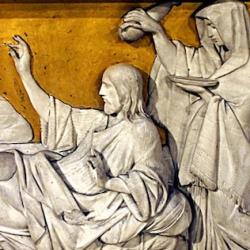The following excerpt is taken from the first volume of my Matthew commentary, recently published by Athanasius Press.
Jesus announces the new law from the mountain; He is Moses on a new Sinai. But in this passage, Jesus assumes another role for a few moments – the role of Solomon the sage. The end of Matthew 6, more than any other, resembles the wisdom literature, especially the book of Proverbs.
Like Solomon, He points us to the natural world to teach us about God and our responsibilities before God. “Go to the ant; observe his ways and be wise,” Solomon had said. There are three things that are stately – the lion, the strutting cock, and a king with his army. Jesus the greater Solomon says, “Go to the birds and grass. Learn a lesson from the world around you.”
Like Solomon too, Jesus presents “two ways,” two paths in life, one a path of foolishness and frustration, the other a path of life and wisdom. Solomon presents this at the beginning of Proverbs as a choice between the Lady Wisdom and the Lady Folly, and He urges the Son to seek Wisdom and choose Wisdom. Jesus the greater Solomon also puts a choice before His listeners: You cannot serve two masters; you have to choose which way you are going to go.
Like Solomon, Jesus is very concerned with the way we regard and use the things of the world. Proverbs is full of practical wisdom for making our way in the world, and it deals a good deal with money and wealth. Jesus the greater Solomon is concerned with our attitude toward and use of food, drink, clothing, and money.
We miss the point of this passage if we just classify it as wisdom literature, a neat little bit of natural theology, and shelve it there. The whole Sermon was prefaced by the announcement of the coming of God’s kingdom, and that is reintroduced here in v. 33, where Jesus tells us to seek not “wisdom” but the “kingdom of God and his righteousness.”
Notice the way Jesus describes his hearers at the end. He distinguishes between His hearers and the “Gentiles.” Jesus’ band of disciples is the true Israel, and those outside are “Gentiles.” The Gentiles are obsessed with earthly success, treasure, and power. But Jesus’ disciples are supposed to be different, obsessed instead with the kingdom of God and His righteousness. These instructions are addressed to disciples, to those who have been redeemed from Egypt, to those who have been called from their nets, to those who have been healed by the power of the Spirit that flows through Jesus.
The wisdom that Jesus speaks here is wisdom only to disciples. The wisdom that the greater Solomon talks about here is foolishness to the Greeks, and would be foolishness to many Jews too. Jesus is not making arguments that everyone can follow, nor offering assurance that anyone can find helpful. His wisdom is wisdom only to those who follow the Son, who have a heavenly Father, and who are citizens of the kingdom that Jesus announces and commences. What Jesus is teaching is directed to disciples, and it assumes the reality of what Jesus calls the kingdom. This is wisdom only in the new world of the kingdom.
What Jesus says here is not wisdom from most perspectives. Don’t be anxious. Think about birds. Look at the grass. No wonder so many have read the gospel as the story of a first-century flower child, an ancient hippy, a Cynic. He seems to be telling us to get out of the rat race and spend our time chasing butterflies. And He does seem to be doing a bit of that. His instructions depend on the fact that a new world has erupted in the midst of the old. A new kingdom and a new king are being heralded in the midst of the corruptions of worldly kingdoms, a new city in the midst of the old cities.
The Old City is a city of anxiety. For Jesus, anxiety is not just a feeling or emotion that we privately experience. It is that. But it is also the organizing principle of a world, a structure and a regime, a master and a power. Anxiety is the ether of the world outside the kingdom of God. Anxiety keeps the stories open 24/7. Anxiety keeps the highways busy until the wee hours of the morning. Anxiety keeps people working late at the office. Anxiety is what builds the skyscrapers. Anxiety is what drives consumer spending.
Anxiety is driven by a very simple insight, the insight that we are limited creatures, and the particular fact that the future sets the boundary of our limitations. We cannot see past the next moment, much less the next day or next month.
Yet we want to be able to manage things. We want to secure our future. We want to be able to know something about what we will eat, drink, wear, do next year, five years, ten years. We want to know that our portfolio will still be expanding, our children will still be living nearby, we will still have a spouse. And we can’t. If you know that you can’t manage the future, and yet you try to manage the future, there can be only one result: anxiety. This is the way of the world, and it’s what drives the Gentiles to “eagerly seek” food, clothing, drink, success, and all the rest.
Jesus invites us into a new world. Jesus announces the kingdom, which, in essence, means announcing God’s future, and the future of God. Jesus comes announcing that the future is arriving. God intends to rule over all things, and He is beginning to rule over all things now. He intends to set Jesus on the throne over the whole cosmos, and He’s beginning to do that now. He’s going to defeat evil and put His world back together, and He’s beginning to do that now.
The future is arriving, and the future is secure in God’s hands. He is the God of the future, and He is establishing His future in the present. And the kingdom which is God’s future world arriving in the present is not driven by anxiety but by trust, because within this kingdom we know that the future is secure. We know that God has everything under control. We know that God is our heavenly Father who will care for us. Jesus’ wisdom is wisdom only if that is true.
Jesus begins by contrasting laying up heavenly treasures with laying up earthly treasures. We lay up heavenly treasures by doing what Jesus said. Verse 19 reaches back to chapters 5-6. When we give alms to the poor in secret, pray in secret, and fast in secret, we are laying up treasures in heaven. When we keep Jesus’ commandments as laid out in chapter 5, we are laying up treasure in heaven.
In contrast, Jesus says that we should not lay up earthly treasure. We do this by doing good works before men to gain reputation and power among men. We also do this when we accumulate money and lands and gold and silver. Jesus describes this process graphically, using the same word twice – the Greek says that we should not “treasure up treasures.” Jesus is not just telling us that we should be oriented to doing our works toward God rather than toward men. He is also insisting on a particular attitude toward earthly wealth, and He is warning about the great harm done by greed.
Warnings against greed are not rare in Jesus’ teaching. This is a regular theme of his teaching and ministry. He accuses the Jews and especially the Jewish leaders of being motivated by greed. The Pharisees are fully of “greed and wickedness” and “full of greed and self-indulgence.” Jesus wants His disciples to avoid this evil. He warns that greed leads to a certain kind of life, a life of uncaring luxury and pleasure, with no regard for the poor and the needy.
This is the attitude of the rich man, who indulges himself while Lazarus lies on his doorstep with only dogs to nurse him. This is what he is saying at the end of Matthew’s gospel when he puts the goats on the left side because they have not done kindness to the least of the brothers. They have not clothed the naked, fed the hungry, cared for those in need – and because of this they are heading to hell. Greed is a deadly sin.
It is deadly in the life to come because it is already deadly in this life. In His encounter with the rich young ruler, Jesus tells the man who boasts that he has kept the law that all he has to do is to give up all his wealth and give it all to the poor. He turns away sorrowing because he was very wealthy, and because he was wealthy he was unwilling to give up his wealth to follow Jesus. His love for money, his greed, leads him to abandon Jesus and cling instead to the wealth. Some of the seed sown by the sower goes into the ground and is quickly choked out because of the concerns and anxieties of this world, because desire for riches chokes out faith.
Jesus says here that the spiritual damage that wealth can cause is enormous, and that it all arises from a false valuation of the security and value of earthly treasure. Ironically, some people treasure up treasures on earth, spending all their time and energy and ingenuity to make sure that they make money.
But this is treasure that moth can destroy, that rust can tarnish, that thieves can steal. There is no way to ensure that this wealth will be preserved. Put it in the stock market, or in the housing market – you can make a bundle for a time, but there is no guarantee that the wealth will still be there when you need it. Treasuring up treasures on earth is bound to lead to anxiety because we know we cannot guarantee the future.
Jesus follows up with the simple reminder that we will die. You won’t be around to enjoy all the wealth you accumulate. Like the rich fool who accumulated treasure and kept building barn after barn, but then found that his soul was required, if you spend your life accumulating money, you’re going to be disappointed. You can’t keep it. You won’t be here.
Jesus asserts that it’s impossible to seek both earthly and heavenly treasures. He describes this in terms of the direction and orientation of our heart. In the Bible, the heart is not the center of emotion as it is for us. Instead, it’s the center of thought, and more deeply the heart is the center of our basic orientation in life. Our lives go in the direction of our hearts. We have one heart, and it is directed toward either heaven or earth (v. 21). It can’t go in both directions at once. It cannot be directed toward heavenly treasure and earthly treasure. There’s only one of them, so it has to be facing in one direction or another, not both at once.
Jesus also describes our wealth in terms of our eyes. Eyes in Scripture are organs of judgment and evaluation. If our eyes value earthly things, our whole body is in darkness; to be full of light, our eyes must be open to heavenly treasures (vv. 22-23). Or, Jesus might have in mind the fact that we are to have our eyes open to the coming of the kingdom, and that we are to value the kingdom above all.
Jesus describes mammon, wealth, as a master. That sounds metaphorical but it isn’t.[1] Money becomes a master; wanting to make it big becomes the over-arching and dominating power of our lives. Wealth can become our master, dictating how we spend our time, talents, leisure, energy, etc. Wealth can become so dominant that it becomes an obsession. We want the new thing all the time, the latest thing, and we have to make just one more dollar, just one more big deal. Money is a master, and it is a fearful master. If we are servants of Mammon, we cannot be servants of God (v. 24).
“But, but,” we say. “But we’re not Gnostics, so earthly things are good, right?” Yes, earthly things are good. Jesus doesn’t deny that earthly things are good. God made them. Of course they are good. Heavenly things, though, are better and more secure. Earthly treasures are always at risk in a way heavenly treasures are not (v. 20). If you want a guaranteed investment, an investment that is completely free from the danger of moth, rust, or thieves, then you need to invest in heaven, not on earth. You need to do the righteousness of the kingdom, which includes giving money away rather than hoarding it.
Another objection comes: “But we’ve got to live!” Yes, and Jesus assures us that the way to be sure that we will have enough is to put worry aside and trust our Father. Jesus makes several points. He doesn’t simply say “don’t worry.” He does say that. But that’s not all that he says. He points us to disciplines, lines of thinking, and actions that will keep us from anxiety and worry. He emphasizes that life is greater than food and clothing (v. 25). Isn’t it pitiful when our lives become about having the latest fashion, or the newest video game? Isn’t it pitiful when we expend our energies at work and never enjoy the fruits of our work? Isn’t life more than that? We can become so anxious about how we’re going to live that we never live.
The Father feeds the birds who don’t spend a second planning or gathering for the future, and He loves us more than birds (v. 26). He clothes the grass that lasts only a day with glory like Solomon’s (vv. 30-31). So the objection that we need to live is true, but it’s beside the point. Our Father knows that we need to live. He demonstrates His extravagant mercy and generosity every day, if we would but open our eyes to see it. Part of the setting in Jesus’ teaching is the formation of a community of disciples who trust and serve the Father. Individual disciples can be anxiety-free because we know that our brothers and sisters provide a safety net that will catch us. That is one of the ways our Father cares for us.
Jesus gives a command here. Do you really think about the birds and the grass? Have you ever looked at the gnats or mosquitoes that bug you in the summer and wonder at a God who keeps such things alive? Have you ever glanced at the fish in the pet store that are no more than swimming gnats, and considered the fact that they are sustained by the heavenly Father? Who do you think feeds the coyotes or the wolves or the elk or the moose? You don’t. Our Father takes care of it all, and Jesus commands us to think about that.
Finally, He points out the folly of anxiety. We can add nothing to life by being anxious about it (v. 27). Worrying about the bad things that might happen tomorrow doesn’t keep them from happening (v. 34). Besides, we’ve got plenty to deal with today. Above all, “your heavenly Father knows that you need all these things” (v. 32). Do you trust Him?
Jesus’ wisdom is a paradoxical wisdom, the wisdom of the kingdom of God. In this kingdom, we can only be guaranteed sufficient goods if we renounce hoarding and greed. In this kingdom, we know we can have food and clothing if we seek something else than food and clothing. In this kingdom, we cling to a master who is despised and rejected and ultimately crucified. In this kingdom, we can only find life if we first lose it. That is the wisdom of the kingdom, the wisdom of Jesus, the greater Solomon.
[1] See Philip Goodchild, Theology of Money (Durham: Duke University Press, 2009), pp. 6-7: “God and wealth are set in competition; for time, in terms of ‘storing up treasures’; for attention, in terms of the health of the eye; and for devotion, in terms of service. Our evaluations are primarily expressed not by what we say or simply by what we do, but by how we pray – the determination of our time, attention, and devotion.” Money’s power is seen “not simply in the worship or accumulation of wealth for its own sake, but in the way time, attention, and devotion are shaped by the demands of the social institution of money.” The opposition of God and money comes to this: “wealth contains its own principles according to which time, attention, and devotion are allocated. In a society organized primarily for the pursuit of wealth, nothing could seem more evident and unquestionable than that time, attention, and devotion should be allocated to the pursuit of wealth. It is the very obligation to do so that constitutes the spiritual power of money.” Economic theory examines the “outcome of economic activity” and involves “the investigation of the powers and principles by which time, attention, and devotion are distributed.” Theology can’t be content with this, but must be “an exploration of the nature and effects of money’s mysterious power.”

